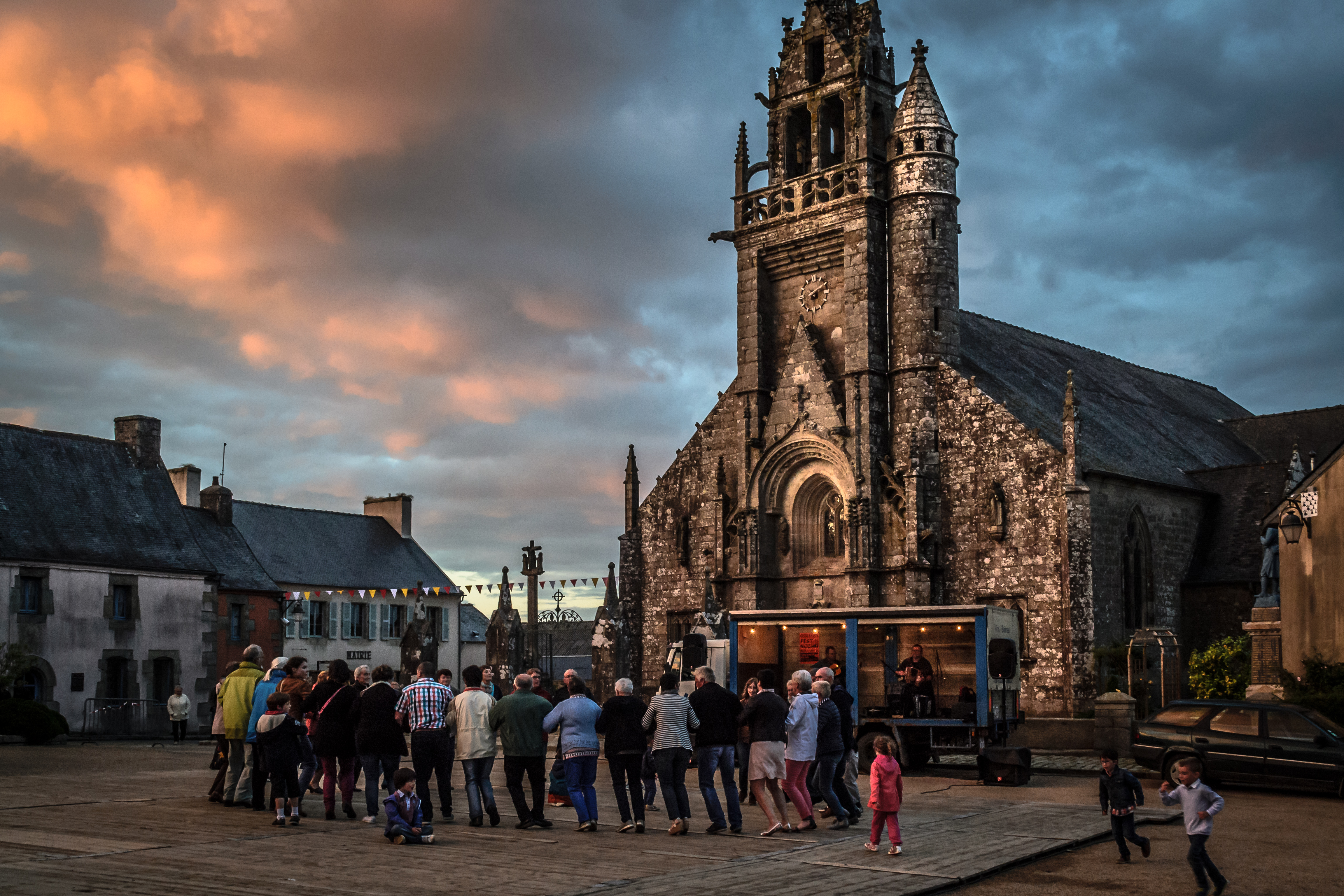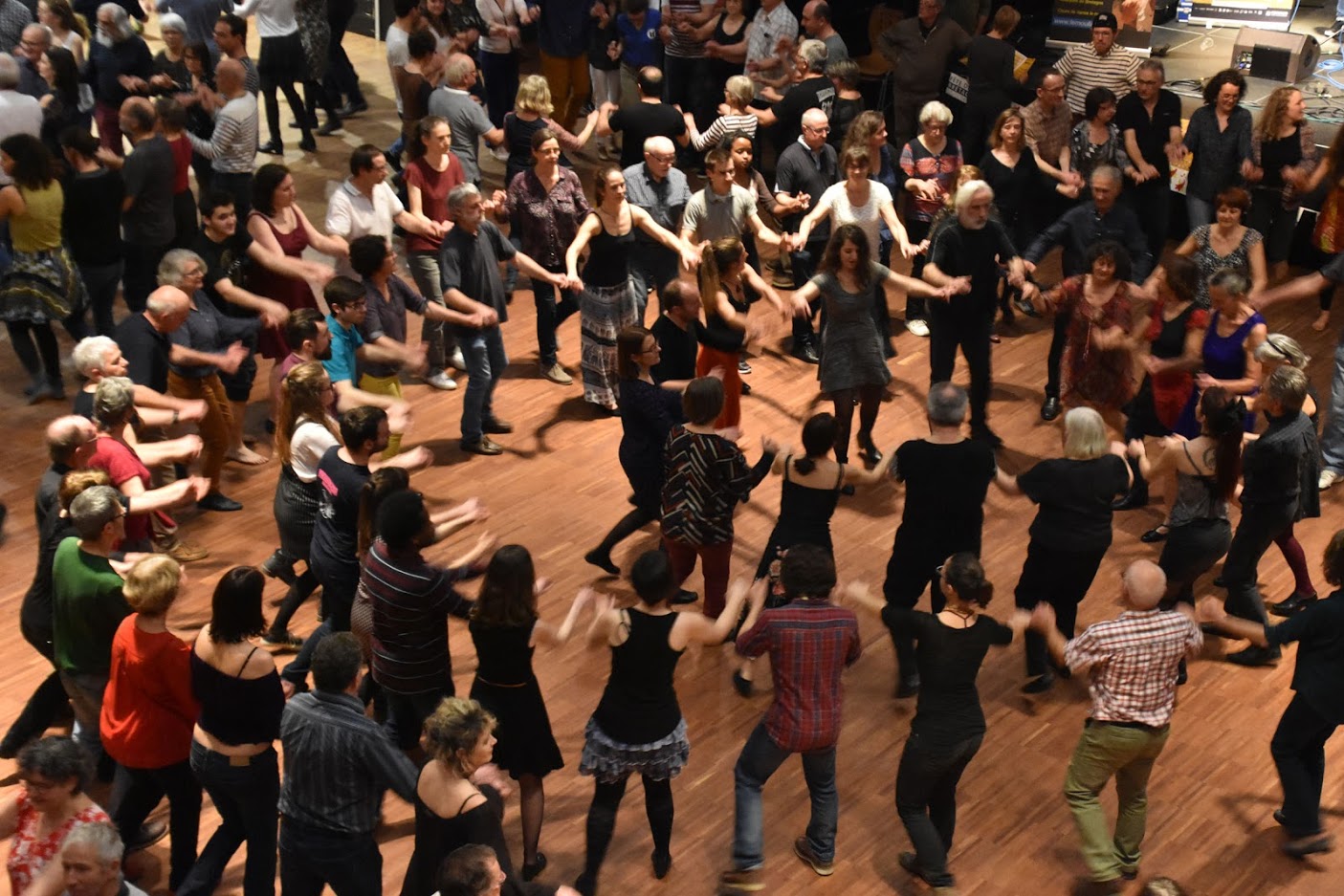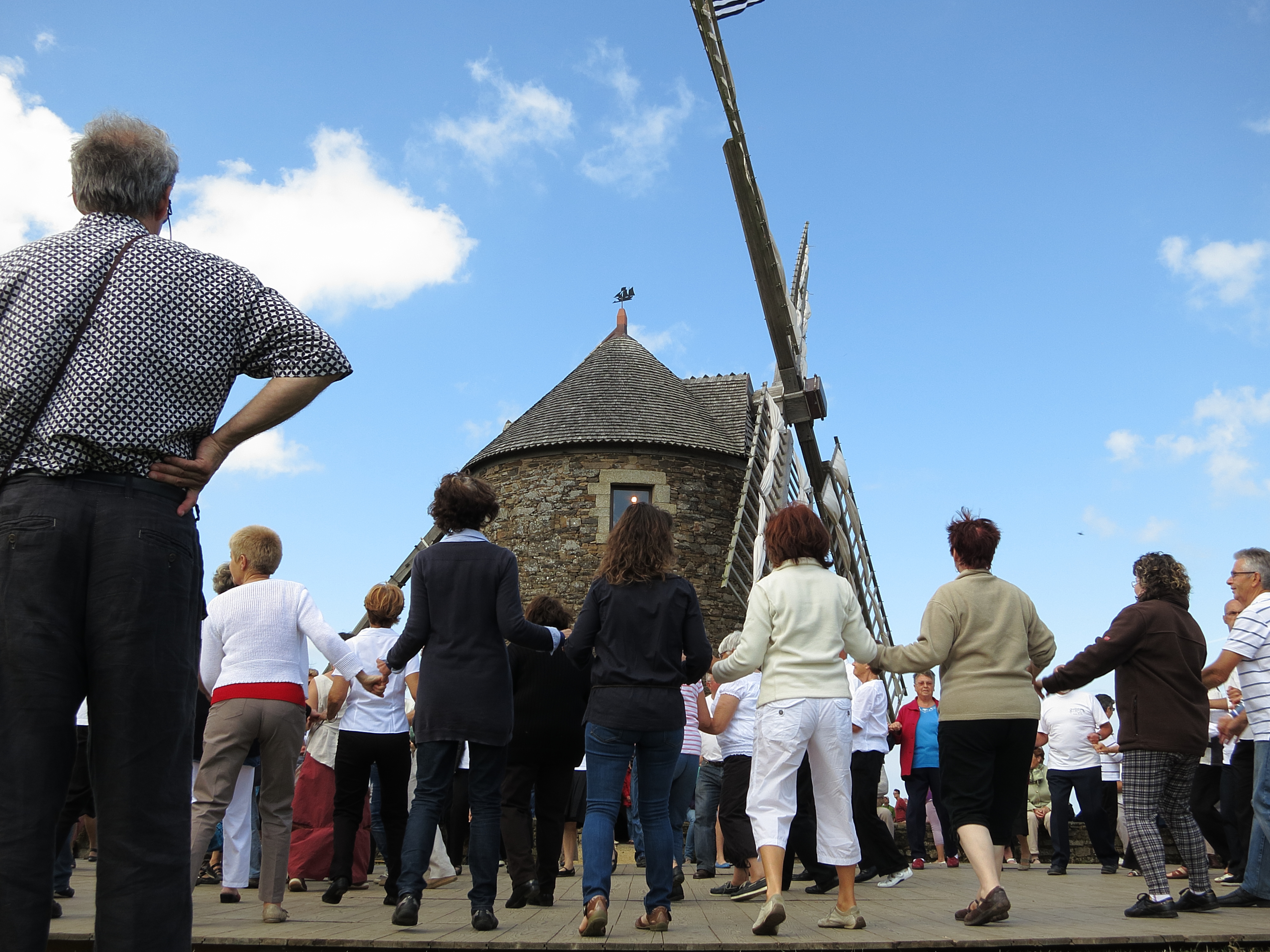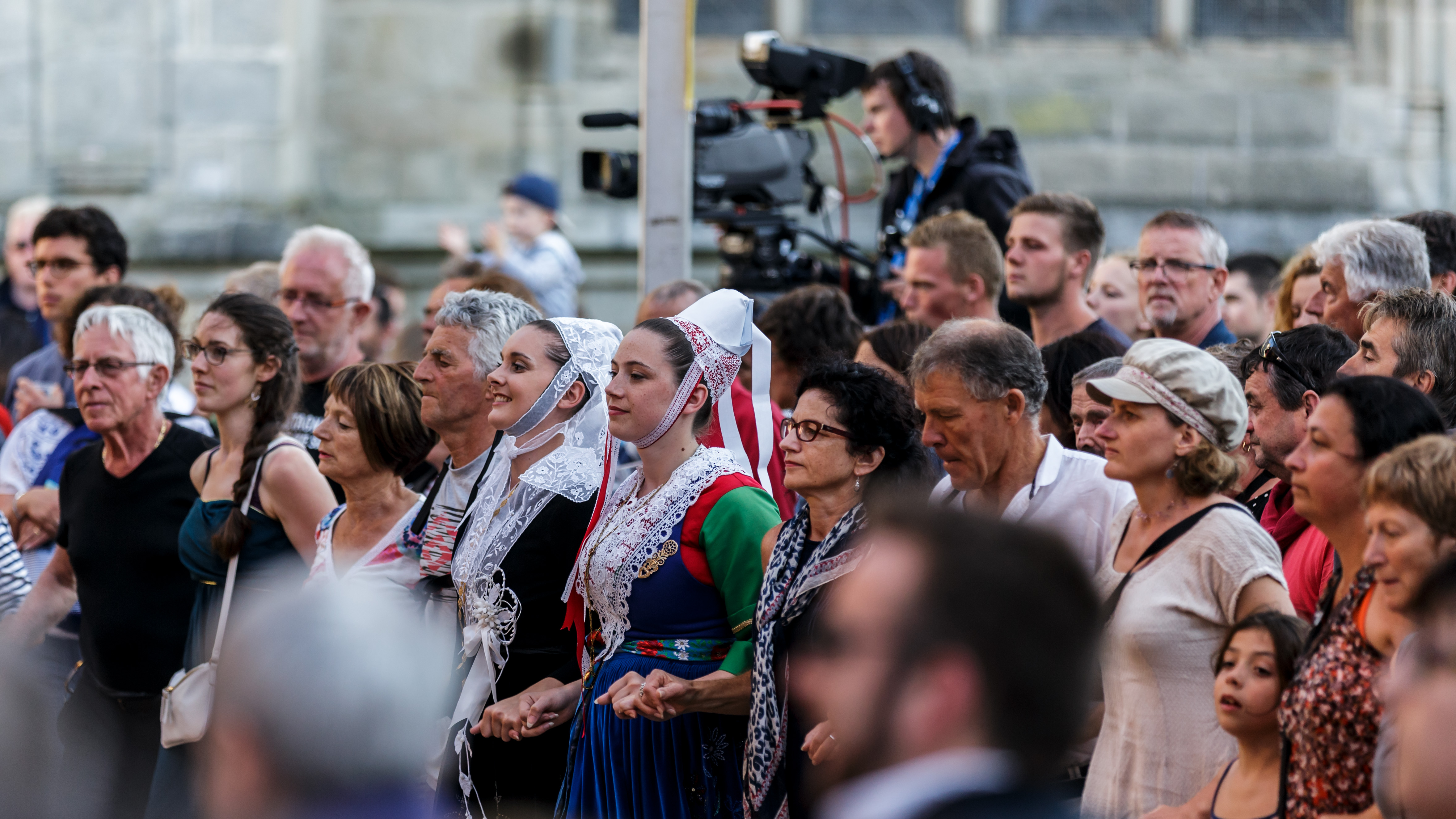Fest Noz, festive gathering based on the collective practice of traditional dances of Brittany
« Fest Noz » is a tradition specific to Brittany, a French territory in the West of the country. It all started centuries ago, when in the traditional rural society, people would gather at night after different communal events. Like harvests, weddings, or pilgrimages. Everyone could participate to the Fest Noz, especially as both men and women were working together during the day. These events may have held many names, but the one transmitted through history was «fest noz». Which means in breton «night party».

After a day of work made of mutual aid and solidarity, these parties were the moment to reinforce community bonds through collective dances. During the day, already, workers would sing altogether to make the chore seems less of a pain. At night, the dances were there to “wake people up” after a tiring day in the fields, most of the time. But the Fest Noz wasn’t just a place to dance. Workers were offered a shared meal, and they could participate to many activities. They could take part of singing rounds, oral jousting, musical improvisations and even small dance competitions. The party was going into late in the night, thanks to a mutual encouragement from dancers to singers. And the other way around.
A format that evolved but kept the same spirit
At some point during the 20th Century, a societal switch shook up the Fest Noz’s organization and reason of existing. Indeed, industrialization and modernization, with more and more people leaving the countryside to live in cities made such gatherings less and less frequent.

The threat to see the tradition as well as dance, song and instrumental music repertories disappear was real. This is why Celtic Circles (non-profits that aim to promote Brittany’s culture) decided to take action. And save this important part of their legacy. They created a new kind of gathering, inspired from modern ways of partying, like balls. But with Fest Noz’s dances and musical traditions. At the time, it was truly a revolution since most of the parties were private. And those new events were public, in common rooms or public fields. This way, even urban Bretons (i.e. Brittany locals) could participate. The parties involved multiple bands or singers, hired for the occasion, with a proper sound system (not just “natural” voices and music anymore). There was an entrance with a fee, making it more official. Those events were named after their original format : the new Fest Noz were born.
Since then, the Fest Noz format hasn’t changed much, except from the music allowed there and the spread of the event all over Brittany. In the 1970’s, during the emergence of folk music, many young people discovered Breton music and dances (similar to folk music) and began to participate to Fest Nozs, even in cities. After a hyped moment, there were less and less fest Nozs organized until the late 1980’s when local professional dancers and musicians grew an interest for their own culture and became professionals in Breton music or dance. Thus, Fest Noz became incredibly popular on the eve of the year 2000.
Festivals that are now very popular in Brittany and beyond
Today, Fest Nozs are pretty much similar to their historic format, thanks to their lack of norms and rules. If there are evident codes and practices allow the tradition to exist and be transmitted, the open-minded spirit of Fest Nozs led to the creation of new dances and music styles. Moreover, modern music styles got introduced along the years, such as electric music, rock, jazz and so on. The only rule to perform in a Fest Noz is to respect the spirit of the tradition. For instance, rock bands are welcomed but they need to add a Breton-like aspect to their music.

In their current format, Fest Nozs take place just outside of farms in the countryside. Or on public places, in concert rooms or social-cultural structures in cities. During the party, multiple bands or solo performers follow each other on stage. It is common for them to play all together and improvise at the end of the night. During songs, participants perform different historic dance styles (the famous round dance for instance). There are around a thousand Fest Nozs a year in Brittany only, animated by at least as many musicians and singers (amateurs and professionals). It is so popular that participation can fluctuate from a hundred to five or six thousand people.
Transmission through immersion, but not only
Traditionally, the Fest Noz traditions is transmitted through repetitive participation to the event. Since it is the best way to see what it’s like and practice the dances. But transmission of other skills and memories is also done in other ways. Locals and volunteers make video archives available to the public, organize trainings and regular classes (to learn dances or musics), publish papers and articles, hold websites to promote the events… In parallel, professional music and dance schools recently started to teach Breton techniques. That will allow students to perform in Fest Nozs. Specialized schools, created by non-profits, also participate in the transmission, and teach to hundred of students every year. But again as they say, “practice makes perfect” and young people are strongly encouraged to just participate to a Fest Noz. It is actually pretty common for parents to bring their young kids and make them dance if appropriate.

Organizing a Fest Noz : a way to learn and transmit
The organization of a Fest Noz is also considered a great way of transmission, and everyone is pushed to help. There is no central instance to organize it since it’s an event with multiple locations. But organizers follow the same pattern. Most of the organizers are part of small local associations. There is no form of regional federation of Fest Noz organizers. However, indirectly, certain regional structures played and continue to play a particular role in the success of the Fest Noz.
A tradition very important to locals for its social aspects
Brittany’s culture is incredibly strong and makes all locals very proud of their land. But Fest Nozs hold a special place in their heart. The Fest Noz, through the years, made sure to preserve not only its entertainment side but a major social purpose that Bretons love. Thanks to a great friendliness, an important proximity between singers, musicians and dancers, a social and multi-generational mix, Fest Noz really are a place to socialize and be a community. Though many people attend to the Fest Noz to dance or to listen to music and sing. Others, and especially locals, just drop by to meet people, have a drink, and enjoy the atmosphere.

Fest Noz continues, after all these years, to be the festive event that naturally goes along social life’s key moments. It also strongly reinforce the Breton identity and feeling of belonging. Locals and communities perceive Fest Noz as a part of themselves. And it helps them to discover and explore their Breton culture and identity. Many locals who went to live away participate in Fest Noz organized in their cities all over France and sometimes abroad. Fest Noz elements are occasionally part of large-scale Celtic festivals. Such as the Cornouaille Festival in Quimper (200,000 visitors) and the Interceltic Festival in Lorient (500,000 visitors).
As a fun fact, during lockdowns due to Covid-19, the organization Tamm-Kreiz organized virtual Fest Noz. With musicians from their homes who made Internet users dance – this shows just how important this tradition is in Brittany.
Fest Noz: An important cultural heritage that needs protection
This heritage deserves a particular protection not only for its important social facet but also for its cultural aspect. Fest Nozs are a living practice, an immense corpus of repertoires (dances, songs and instrumental arias), traditional practices and “craft techniques” (vocal practices and specific instruments). But it’s also an ensemble of creators, with new music, new bands, new instruments. And crossbreeding with outside genres like rock jazz and world-music.

Fest Noz are a sort of music and dance laboratories that permanently create art. It also has its own economy, with the emergence of hundreds of professional musicians and thousands of amateur musicians. These passionate musicians directly impact the economy with their needs for stage professionals, artistic production workers and even record production teams. Fest Noz also participate in the development of dozens of institutional or associative educational structures. Moreover, the success of numerous festivals based largely on Fest Nozs are here to prove the importance of its cultural aspect. But the fact that everything is alive and only relies on its regular practice makes it particularly fragile and justifies a protection from the UNESCO. Unesco, in 2012, listed Fest-Noz, festive gathering based on the collective practice of traditional dances of Brittany on the Representative List of the Intangible Cultural Heritage of Humanity.
RESUME
«Fest Noz» is a tradition specific to Brittany, a French territory in the West of the country. In their current format, Fest Nozs take place just outside of farms in the countryside, or on public places, in concert rooms or social-cultural structures in cities. During the party, multiple bands or solo performers follow each other on stage. It is common for them to play all together and improvise at the end of the night. During songs, participants perform different historic dance styles (the famous round dance for instance).
Brittany’s culture is incredibly strong and make all locals very proud of their land, but Fest Nozs hold a special place in their heart. They perceive Fest Nozs as a part of themselves and it helps them to discover and explore their Breton culture and identity. Many locals who went to live away participate in Fest Nozs organized in their cities all over France and sometimes abroad. Due to its importance in Breton traditions, Unesco, in 2012, listed Fest-Noz, on the Representative List of the Intangible Cultural Heritage of Humanity
